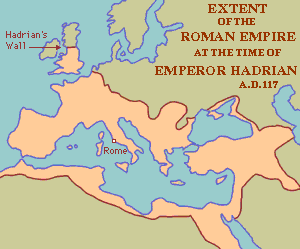 From post-Roman to Norman Britain;
From post-Roman to Norman Britain;Evidence for an apartheid-like social structure in early Anglo-Saxon England
When the Romans left Britain in 400 the Britons invited around 430 the Angelen and Saxons to protect them. f.i. the Hadrian Wall was build 122 AD against the Schots, Irelanders and Vikings. The river Rhijn halfway the Netherlands was the Roman border against Frysians and Germans since the Flemish in Belgium and Franks in France were beaten.
They used oakwood ships with 24 or 40 rowers who could carry 60 people over the canal. Some say however the first Schotsman was a Dutchman who did not want to pay and swam across. The settlers where farmers and feudal warriors. The number of kingdoms fighting each other dropped from 19 to 7 after 664 and later to 5 and became a heptarchy this is five Kingdoms always fighting each other unless they where attacked themselfs by an outside enemy invasion.
The American civil war between the trade rich North and the labor intensive poor South has been the result of this old trible war.
BBC; An apartheid society existed in early Anglo-Saxon Britain, research suggests.
Britain 'had apartheid society' [Modern-day England has] a population of largely Germanic genetic origin, speaking a principally German language Dr Mark Thomas, UCL
Scientists believe a small population of migrants from Germany, Holland and Denmark established a segregated society when they arrived in England.
The researchers think the incomers changed the local gene pool by using their economic advantage to out-breed the native population.
The team tells a Royal Society journal that this may explain the abundance of Germanic genes in England today.
There are a very high number of Germanic male-line ancestors in England's current population. Genetic research has revealed the country's gene pool contains between 50 and 100% Germanic Y-chromosomes.
But this Anglo-Saxon genetic dominance has puzzled experts because some archaeological and historical evidence points to only a relatively small number of Anglo-Saxon migrants.
Estimates range between 10,000 and 200,000 Anglo-Saxons migrating into England between 5th and 7th Century AD, compared with a native population of about two million.
Ethnic divide
To understand what might have happened all of those years ago, UK scientists used computer simulations to model the gene pool changes that would have occurred with the arrival of such small numbers of migrants.
The team used historical evidence that suggested native Britons were at a substantial economic and social disadvantage compared to the Anglo-Saxon settlers.
The researchers believe this may have led to a reproductive imbalance giving rise to an ethnic divide.
Ancient texts, such as the laws of Ine, reveal that the life of an Anglo-Saxon was valued more than that of a native.
Dr Mark Thomas, an author on the research and an evolutionary biologist from University College London (UCL), said: "By testing a number of different combinations of ethnic intermarriage rates and the reproductive advantage of being Anglo-Saxon, we found that under a very wide range of different combinations of these factors we would get the genetic and linguistic patterns we see today.
"The native Britons were genetically and culturally absorbed by the Anglo-Saxons over a period of as little as a few hundred years," Dr Thomas added.
"An initially small invading Anglo-Saxon elite could have quickly established themselves by having more children who survived to adulthood, thanks to their military power and economic advantage.
"We believe that they also prevented the native British genes getting into the Anglo-Saxon population by restricting intermarriage in a system of apartheid that left the country culturally and genetically Germanised.
"This is exactly what we see today - a population of largely Germanic genetic origin, speaking a principally German language."
By the time of King Alfred the Great in the ninth century, the differences in legal status between Anglo-Saxons and Britons had faded out altogether.
Two centuries later, the Normans invaded England and imposed their own apartheid, giving themselves higher legal status than the Britons and allowing Norman men to marry native women but preventing native men from marrying Norman women.
The research is published in the
Proceedings of the Royal Society B: Biological Sciences
ISSN: 0962-8452 (Paper) 1471-2954 (Online)
Issue: FirstCite Early Online Publishing
DOI: 10.1098/rspb.2006.3627
No comments:
Post a Comment